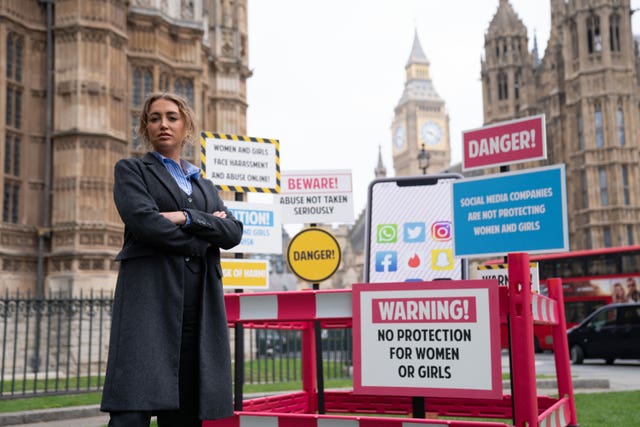
Revenge porn should be made a statutory civil offence to allow victims redress without having to go through a “retraumatising” criminal trial, MPs have been told.
In a Westminster Hall debate on tackling image-based abuse, Labour MP Kirith Entwistle said allowing a civil process for victims would give them a “second chance”, and highlighted the rise in deep fake intimate images generated using AI.
Reports to the Revenge Porn Helpline doubled last year, reaching nearly 19,000, according to the organisation’s 2023 report.
Since 2015 the helpline has reported 338,000 intimate images.
Ms Entwistle said survivors often describe their experiences as “digital rape – a term that captures the intensely personal and profoundly scarring nature of this violation”.
The member for Bolton North East said: “Image-based sexual abuse encompasses a wide range of violations. From digitally altered images like deep fakes to invasive acts such as upskirting, downblousing and so-called revenge porn.
“In an increasingly digital world this abuse, this violence, is an escalating crisis.”
Ms Entwistle told MPs: “Our legislation fails survivors by denying them accessible civil remedies such as immediate takedowns and compensation for emotional harm outside a criminal process.
“For survivors who endure years of abuse, the inability to seek swift relief without a lengthy, retraumatising trial is a devastating gap.
“Creating a statutory civil offence for image-based abuse would not only empower survivors to seek redress directly against perpetrators and platforms, it would give them that all-important second chance.”
Ms Entwistle referred to former Love Island star Georgia Harrison, who has been an active campaigner against image-based sexual abuse after having an intimate video posted online by her ex-boyfriend without her consent.

She said: “There is a glaring failure to criminalise abusive images themselves.
“Georgia’s story illustrates this brutal oversight.
“Despite her abuser’s convictions the absence of a stay down provision allows her images to still circulate online, forcing her to relive the trauma with each resurfacing.”
The MP added: “Survivors deserve certainty that once their abuse is addressed it is addressed permanently.”
Conservative former minister Dame Caroline Dinenage, who was involved in the creation of the Revenge Porn Helpline in 2015, said the rise in deep fake pornography “opened up a new front of the war on women”.
“The fact that the use of nudification apps and the creation of really ultra-realistic deep fake porn for private use is still legal, and worse becoming more popular, that is a war on women’s autonomy,” she said.
“It’s a war on our dignity and it’s a war on our identity.”
Justice minister Alex Davies-Jones said the Government is “absolutely committed” to tackling violence against women and girls.
She said: “Tackling online abuse is of course crucial to doing this and the statistics are clear.
“But behind these stats are real people, real victims.
“Many of us will have experienced it ourselves or know friends or family who have.”
Ms Davies-Jones said that current laws targeting intimate image abuse were developed in “piecemeal fashion, with new offences introduced over many years to address different forms of offending”.
She added: “The result is a patchwork of offences with known gaps in protection for victims.
“For example, while it is currently an offence to share a deep fake image without consent it is not an offence to make one.”
The minister said the Government was undertaking a number of new measures, including more training for police, and requirements for social media platforms to take non-consensual content down.
Ms Davies-Jones added: “This is a start but I am clear that this is not the be-all and end-all of tackling intimate image abuse.
“We can and we must do more.
“If we want to see true and lasting change we need a culture shift.
“I’ve said this before and I’ll keep saying it: we need everyone – especially men – to play their part.”
The Revenge Porn Helpline highlighted that in 2023 it received a low number of complaints relating to deep fake or generated content, which its annual report describes as “an anomaly when compared to the societal and political coverage that the issue has received”.


Comments: Our rules
We want our comments to be a lively and valuable part of our community - a place where readers can debate and engage with the most important local issues. The ability to comment on our stories is a privilege, not a right, however, and that privilege may be withdrawn if it is abused or misused.
Please report any comments that break our rules.
Read the rules here